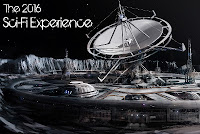Welcome to week five of the read-along of Jacqueline Carey’s Kushiel’s Scion. This week’s questions cover chapters 37 through 44, and they’re provided by Lynn of Lynn’s Books. If you’re interested in getting involved in this or future read-alongs, please check out our goodreads group! Now, on to the questions, and beware of spoilers through chapter 44 below!
1.Firstly, what do you make of The Guild and why do you think Anafiel declined to join them. Do you think Imriel should join them?
I expect it is not more complicated than Claudia suggested, and Anafiel did not want to swear loyalty to something that might interfere with his previous loyalties. If it came down to it, I doubt Anafiel would have ever put anything above Rolande. I bet the Guild wasn’t very happy about that, either. I suspect Imriel will follow the same route as Anafiel, especially since he has already given an oath of loyalty to Sidonie.
2. We have the philosophical debates - how do you think these are going to play a part in the story overall, if at all?
I still think Piero’s class was mostly useful for introducing the other students who would become Imriel’s friends. I think the latest lecture was valuable for them, though, to remind the college kids why the locals might not be particularly fond of them. I guess this is something that was as true in their Tiberium as it is in modern day university towns.
3. Claudia - what do you make of her. Do you trust her?
I guess I trust her to be who she is, which means she’s certainly not telling Imriel the whole truth. I trust that she likes sleeping with him, and that she probably does want him to join the Guild and not be killed.
4. We have lots of possible attempts on Imri’s life, even going so far as to start a student riot - and his own attempts to bring these to a stop. What do you make to all of it?
I really enjoyed his scheme to stop the murder attempts! I also thought it was pretty funny how shocked the guy was that Imriel did not take the assassination attempts personally. I guess it’s happened enough times so far in Imriel’s life that he’s a little used to it.
However, I think he was bluffing about the letter to the ambassador, right? I mean, there was a letter, but he gave it to the priest before he found out Caccini’s name and location. He could have given some general information (Bernadette de Trevalion has hired someone here to kill me), but it couldn’t have singled out Caccini.
5. Two particular characters that I find intriguing are Canis and Piero. What were your first impressions and how do they differ now?
They both seem like decent, non-murderous people, but I don’t think my opinion of them has changed in any significant way. I can see why Imriel likes Canis, since he has essentially done what Imriel wishes he could do, completely discarding his own identity in order to be free.
Other Things:
—Poor Gilot! I hope he recovers fully.
—I’m glad Imriel appreciates what a good friend he has in Eamonn. He’s such a good guy, helping out Imriel and accepting that he isn’t telling him everything.





